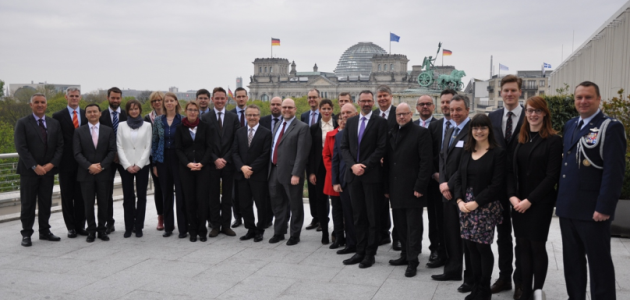The discussion at the US Embassy in Berlin focused on the transatlantic relations under the new US administration as well as the significance of NATO.

New perspective: The seminargroup of the 2017 Core Course together with their hosts on the roof terrace of the US Embassy in Berlin. Picture: Embassy of the United States, Berlin
The second module of the Core Course focuses on centers of power, with a particular emphasis on the United States, China and Russia. In late April, the Core Course therefore paid a visit to the Embassy of the United States in Berlin. The discussion with the Acting Deputy Chief of Mission, Jeffrey Hovenier, was moderated by the President of the Federal Academy for Security Policy, Dr Karl-Heinz Kamp. It primarily focused on the transatlantic relations under the new US administration and the significance of NATO. In view of the many different global threats and challenges the world is currently facing, all participants of the discussion emphasized the importance of solid and reliable transatlantic relations. Crises and conflicts such as in eastern Ukraine and Syria, but also the refugee and migration flows, were described as having an enormous impact on the resilience of existing alliances and on Germany’s bilateral relations with other states.
The new US administration sees Germany as a key partner
The US partners stated that it was not surprising that relations with the United States have to be redefined and renegotiated under the new administration, and that this process required a certain period of time to complete. At the same time, Hovenier also emphasized that the US and Germany have longstanding and intensive relations based on their common interests and values, with the Federal Republic being one the United States’ five most important allies. The fact that three government representatives have already visited the US since the new US President took office was seen as a positive start.
Western values remain as key frame of reference
It was underlined that, in view of the difficult global constellations of cooperation, it was important to uphold the common Western values. The discussants found that Russia’s annexation of Crimea, which was illegal under international law, had once again brought deterrence and defence to the top of the international security agenda. Russia should not be allowed to question the sovereignty of other states, or to adjust international borders that have existed since the end of World War II. The United States had shown a strong commitment to restore NATO’s defensive capabilities and was bearing most of the military and financial burden of the alliance.
The United States continued to see NATO as an important alliance. However, in view of its political and military significance as well as its geographical location, Germany in particular should be aware of its responsibility regarding the issue of burden-sharing, the US partners said. Like all NATO member states, the Federal Republic of Germany had agreed to allocate at least two percent of its GDP for defense purposes, and to use at least twenty percent of this expenditure for new investments as a means to address the fundamentally altered security situation.
The dynamic and open discussion at the US Embassy was very much appreciated by the participants of the Core Course, and it also marked a successful start for the subsequent field study, which took the course group to Washington, DC and New York City shortly afterwards.
Author: Sandra Oelke
